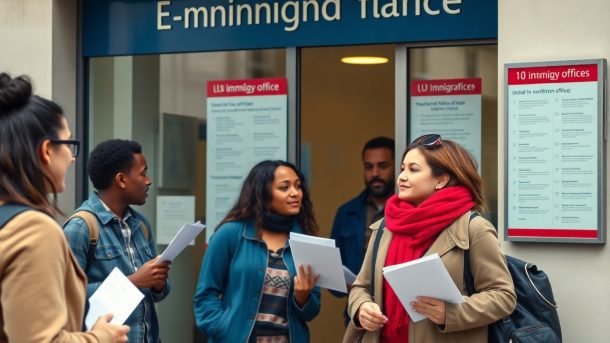You may find yourself in a challenging situation if your UK visa application has been refused. Understanding the legal steps to appeal this decision is vital for navigating the process effectively. This blog post will outline the necessary actions you can take to challenge a visa refusal, providing clarity on the appeal procedure and your rights. For detailed guidance on the appeal form, you can refer to A guide to completing IAFT-6 Appeal Form.
Key Takeaways:
- Understanding the Refusal Reasons: Before proceeding with an appeal, it is imperative to thoroughly analyze the reasons provided by the Home Office for the visa refusal. This helps in addressing specific concerns during the appeal process.
- Submission of Appeals: Appeals must be submitted within the specified timeframe, usually 14 days for visitors and longer for other visa types. Ensure that all supporting documents are included to strengthen your case.
- Legal Representation: Seeking legal advice or representation can significantly enhance the chances of a successful appeal. Experienced legal professionals can help navigate the complexities of immigration law and improve the quality of your appeal submission.
Understanding Visa Refusal
To effectively appeal a UK visa refusal, you first need to understand why your application was denied. Visa refusals can stem from various factors, including insufficient documentation, failure to meet specific criteria, or doubts about your intentions. Understanding the reasons behind the refusal is vital for building a strong case during the appeal process.
Common Reasons for Refusal
Below are some typical reasons for visa refusal that you may encounter. These can include inadequate financial evidence, failure to demonstrate a genuine relationship in spouse visas, or the inability to provide requested biometric information. Each case presents unique circumstances, and knowing these reasons helps you prepare a more compelling appeal.
Legal Framework Governing Appeals
Along with understanding the reasons for your visa refusal, it is important to familiarize yourself with the legal framework that governs appeals. This framework outlines your rights and the procedures you must follow to challenge the refusal effectively.
Refusal decisions are usually guided by specific immigration rules, policies, and laws set out by the UK government. The appellate process allows you to challenge the decision through either an Administrative Review or an appeal to the First-tier Tribunal. Understanding these avenues helps you navigate the legal landscape, ensuring you follow the correct procedures and comply with deadlines, increasing the chances of a successful outcome for your appeal.

Initial Steps Before Appealing
Any decision to appeal a UK visa refusal should begin with careful assessment of your situation. Consider the reasons for refusal and whether an appeal is the best course of action for you. This initial step is vital for ensuring that your next moves are well-informed and effectively address the concerns raised in the refusal notice.
Reviewing the Refusal Notice
After receiving your refusal notice, take the time to thoroughly read and understand its contents. Identify the specific reasons cited for the refusal, as this will guide you in formulating your appeal. Understanding the decision will allow you to address the concerns and present a more compelling case in your appeal.
Gathering Supporting Documents
Appealing your visa refusal requires a strategic collection of supporting documents. These documents should directly address the reasons outlined in your refusal notice and strengthen your case for reconsideration.
But gathering supporting documents isn’t just about quantity; it’s about relevance and clarity. Ensure that each document you compile directly pertains to the issues at hand and showcases your eligibility for the visa. Consider including evidence such as updated financial statements, employment letters, or clarifications on any misunderstandings that may have led to the refusal. A well-organized folder of compelling evidence can make a significant difference in the appeal process.

The Appeal Process
Your appeal process is initiated once you receive a refusal notice from the UK Home Office. You must understand that this is not a mere formality; it involves a specific set of procedures that you must follow diligently. Your appeal can be heard by an independent tribunal, which has the authority to overturn the original decision. Knowing your rights and the steps involved will significantly enhance your chances of success.
Filing the Appeal
Along with the refusal notice, you will receive instructions for filing your appeal. This typically requires completing a specific form and submitting it within a designated timeframe. Ensure you provide supporting documents that bolster your case, as these will be vital for the appeal tribunal’s examination. Keep copies of everything for your records.
Timeframes and Deadlines
Against the backdrop of the appeal process, you must be acutely aware of the timeframes and deadlines involved. Each case has specific time limits within which you can file an appeal, usually within 14 days of receiving your refusal notice. Missing these deadlines can jeopardize your ability to contest the decision.
Considering the appeal process and its associated deadlines, it’s vital to act quickly and efficiently. The strict timelines are in place to ensure a timely resolution of cases. It’s advisable to gather all requisite documents and evidence promptly, ensuring you have ample time to review your application before submission. Being organized will help alleviate the stress associated with the appeal process and improve your chances of a favorable outcome.
Preparing for the Appeal Hearing
Now, it is imperative to adequately prepare yourself for the appeal hearing, as this will significantly influence the outcome of your case. Familiarize yourself with the grounds for your appeal and the specific concerns raised in the initial refusal letter. Develop a clear strategy, understanding the legal aspects, and practice your presentation to ensure confidence and clarity during the hearing.
Structuring Your Argument
Above all, you should create a structured argument that addresses every point made in your visa refusal. Begin by outlining your position clearly and logically, ensuring you highlight any relevant regulations or legal precedents. Articulate how your circumstances align with the criteria set out by the Home Office, and anticipate counterarguments that may be raised during the hearing.
Presenting Evidence
Below, ensure you present compelling evidence to support your case during the hearing. Gather all necessary documents, such as financial records, identity confirmations, or any other supporting materials that could bolster your argument. Ensure that your evidence is organized and readily accessible, as this will allow you to respond effectively to any queries from the tribunal.
At the appeal hearing, your evidence should clearly substantiate your arguments. Each piece of evidence must relate directly to the points you are making and should demonstrate your eligibility for the visa. Use visual aids such as charts or timelines if appropriate, and refer to specific documents when discussing your case. This organized and thorough presentation will help strengthen your position and improve your chances of a favorable outcome.
Possible Outcomes of an Appeal
Many applicants face uncertainty following an appeal on their UK visa refusal. The potential outcomes include the granting of your visa, a maintenance of the refusal decision, or the option to seek further avenues of recourse. Understanding these possibilities allows you to prepare for each scenario and make informed decisions regarding your next steps.
Granting of Visa
One potential outcome of your appeal is the successful granting of your visa. If the tribunal finds in your favor, you will receive the necessary approval, enabling you to proceed with your plans in the UK. This result directly addresses the issues raised in your initial refusal, ultimately affirming your eligibility for a visa.
Further Options if Appeal is Denied
Denied appeals can feel discouraging, but you still have options. You may choose to reapply for a visa, considering any new information or changes in your circumstances that could strengthen your case. It’s also possible to explore judicial review or seek legal advice for additional routes to address the refusal.
It is important to evaluate your circumstances carefully if your appeal has been denied. You might want to consult an immigration solicitor for guidance tailored to your situation. They can help you understand the grounds for your refusal and suggest strategies to improve your chances in a fresh application or explore other legal avenues, such as a judicial review. Each option presents different challenges, and a legal professional can help you navigate these paths effectively.
Seeking Legal Assistance
Once again, navigating the complexities of appealing a UK visa refusal can be daunting. Engaging a legal professional brings expertise and guidance, ensuring that you understand your rights and the appeal process. A lawyer who specializes in immigration law can help interpret the reasons for your visa denial, prepare your appeal documents, and represent you effectively before the appropriate authorities.
When to Consider Legal Help
With several factors to consider, determining when to seek legal assistance is important. If your visa refusal includes complex legal issues, you have previously faced rejections, or you’re uncertain about the appeal process, it’s wise to consult an immigration solicitor. Their insight can clarify your options and enhance the likelihood of a successful appeal.
Finding the Right Immigration Lawyer
Assistance in finding the right immigration lawyer is vital to your appeal success. Look for professionals with a strong track record in UK immigration law, as this experience can make a significant difference in your case. Prioritize solicitors who have positive reviews, specialize in visa appeals, and provide transparent communication regarding fees and procedures.
And when searching for the ideal immigration lawyer, consider reaching out to former clients for their recommendations. You can also explore online reviews and legal directories to shortlist potential candidates. Schedule consultations to discuss your case, evaluate their approach, and assess their responsiveness to your concerns. Your choice of lawyer can greatly impact the appeal process, so take your time to find someone you feel comfortable working with.
Final Words
As a reminder, if you receive a UK visa refusal, it’s vital to carefully consider your options for appeal. You can submit an administrative review or lodge an appeal to the First-tier Tribunal, depending on the nature of the refusal. Ensure that you gather all necessary documentation to support your case and adhere to the time limits set by UK immigration rules. Seeking guidance from a legal professional can enhance your chances of a successful appeal, allowing you to navigate the complexities of the process effectively.
FAQ
Q: What are the common reasons for a UK visa refusal?
A: Common reasons for a UK visa refusal include insufficient financial evidence, failure to meet English language requirements, incomplete application forms, inability to demonstrate intent to leave the UK after the visa expires, and inconsistencies in provided information.
Q: What steps should I take immediately after receiving a visa refusal?
A: After receiving a visa refusal, you should carefully read the refusal letter to understand the reasons provided. After that, consider gathering additional evidence or documentation that addresses these reasons. It’s advisable to consult a legal expert to assess the viability of an appeal or reapplication based on your specific circumstances.
Q: How can I appeal a visa refusal decision?
A: To appeal a visa refusal decision, you will typically need to send an appeal form along with a cover letter explaining why you believe the decision should be overturned. Include supporting documents that counter the reasons for the refusal. Be sure to submit your appeal within the timeframe specified in the refusal letter and follow any specific procedures outlined by UK Visas and Immigration.
Q: What is the time limit for appealing a UK visa refusal?
A: The time limit for appealing a UK visa refusal generally varies depending on the visa category and the grounds for refusal. Typically, you must submit your appeal within 14 days for in-country applications or within 28 days for out-of-country applications. It’s vital to check the specifics in your decision letter to ensure compliance with the deadlines.
Q: Can I submit a new application if I choose not to appeal?
A: Yes, you can submit a new application at any point if you choose not to appeal the visa refusal. However, it is imperative to address the issues that led to the initial refusal in your new application. Providing additional or clearer information, or rectifying the issues raised in the refusal letter, can improve your chances of a successful application.




Recent Comments